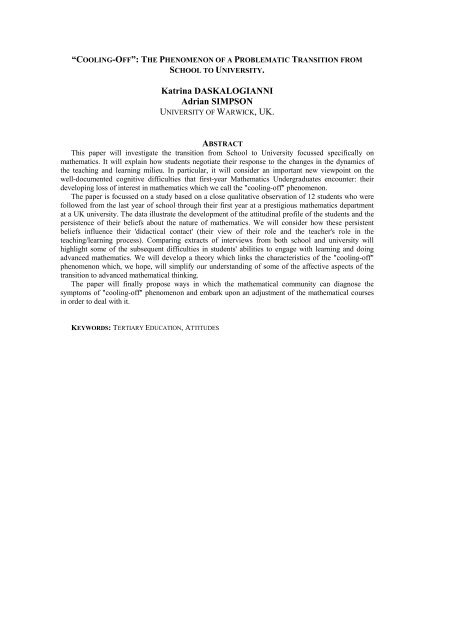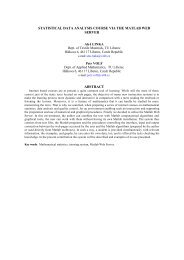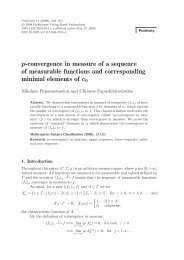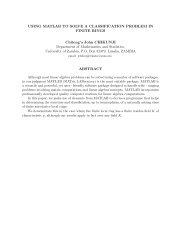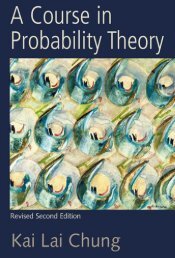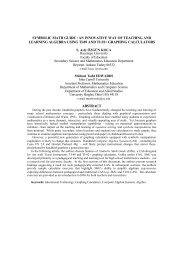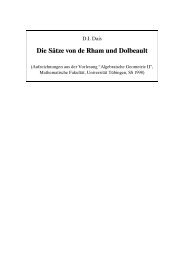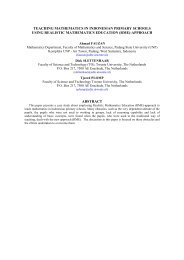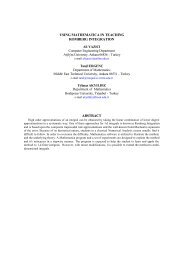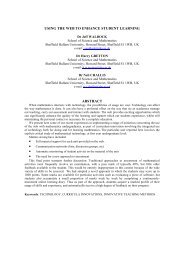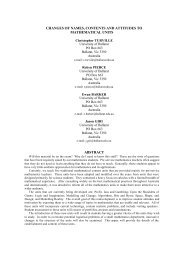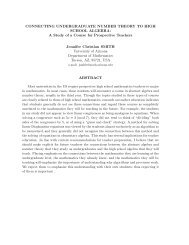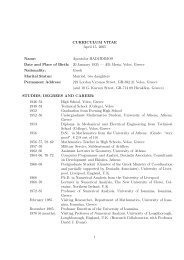the phenomenon of a problematic transition from School to University.
the phenomenon of a problematic transition from School to University.
the phenomenon of a problematic transition from School to University.
Create successful ePaper yourself
Turn your PDF publications into a flip-book with our unique Google optimized e-Paper software.
“COOLING-OFF”: THE PHENOMENON OF A PROBLEMATIC TRANSITION FROM<br />
SCHOOL TO UNIVERSITY.<br />
Katrina DASKALOGIANNI<br />
Adrian SIMPSON<br />
UNIVERSITY OF WARWICK, UK.<br />
ABSTRACT<br />
This paper will investigate <strong>the</strong> <strong>transition</strong> <strong>from</strong> <strong>School</strong> <strong>to</strong> <strong>University</strong> focussed specifically on<br />
ma<strong>the</strong>matics. It will explain how students negotiate <strong>the</strong>ir response <strong>to</strong> <strong>the</strong> changes in <strong>the</strong> dynamics <strong>of</strong><br />
<strong>the</strong> teaching and learning milieu. In particular, it will consider an important new viewpoint on <strong>the</strong><br />
well-documented cognitive difficulties that first-year Ma<strong>the</strong>matics Undergraduates encounter: <strong>the</strong>ir<br />
developing loss <strong>of</strong> interest in ma<strong>the</strong>matics which we call <strong>the</strong> "cooling-<strong>of</strong>f" <strong>phenomenon</strong>.<br />
The paper is focussed on a study based on a close qualitative observation <strong>of</strong> 12 students who were<br />
followed <strong>from</strong> <strong>the</strong> last year <strong>of</strong> school through <strong>the</strong>ir first year at a prestigious ma<strong>the</strong>matics department<br />
at a UK university. The data illustrate <strong>the</strong> development <strong>of</strong> <strong>the</strong> attitudinal pr<strong>of</strong>ile <strong>of</strong> <strong>the</strong> students and <strong>the</strong><br />
persistence <strong>of</strong> <strong>the</strong>ir beliefs about <strong>the</strong> nature <strong>of</strong> ma<strong>the</strong>matics. We will consider how <strong>the</strong>se persistent<br />
beliefs influence <strong>the</strong>ir 'didactical contact' (<strong>the</strong>ir view <strong>of</strong> <strong>the</strong>ir role and <strong>the</strong> teacher's role in <strong>the</strong><br />
teaching/learning process). Comparing extracts <strong>of</strong> interviews <strong>from</strong> both school and university will<br />
highlight some <strong>of</strong> <strong>the</strong> subsequent difficulties in students' abilities <strong>to</strong> engage with learning and doing<br />
advanced ma<strong>the</strong>matics. We will develop a <strong>the</strong>ory which links <strong>the</strong> characteristics <strong>of</strong> <strong>the</strong> "cooling-<strong>of</strong>f"<br />
<strong>phenomenon</strong> which, we hope, will simplify our understanding <strong>of</strong> some <strong>of</strong> <strong>the</strong> affective aspects <strong>of</strong> <strong>the</strong><br />
<strong>transition</strong> <strong>to</strong> advanced ma<strong>the</strong>matical thinking.<br />
The paper will finally propose ways in which <strong>the</strong> ma<strong>the</strong>matical community can diagnose <strong>the</strong><br />
symp<strong>to</strong>ms <strong>of</strong> "cooling-<strong>of</strong>f" <strong>phenomenon</strong> and embark upon an adjustment <strong>of</strong> <strong>the</strong> ma<strong>the</strong>matical courses<br />
in order <strong>to</strong> deal with it.<br />
KEYWORDS: TERTIARY EDUCATION, ATTITUDES
Introduction<br />
“<strong>University</strong> ma<strong>the</strong>matics is a lot like trying strong cheese-really difficult <strong>to</strong><br />
swallow until you get used <strong>to</strong> it. Even <strong>the</strong>n though it still tastes odd.” (First year<br />
undergraduate in ma<strong>the</strong>matics)<br />
The above comment is representative <strong>of</strong> <strong>the</strong> views expressed by many first year<br />
undergraduates in ma<strong>the</strong>matics we have come across (and <strong>the</strong>re is no reason <strong>to</strong> believe that it<br />
does not represent views <strong>of</strong> many ma<strong>the</strong>matics students more generally).<br />
The issue <strong>of</strong> <strong>the</strong> <strong>transition</strong> <strong>from</strong> school <strong>to</strong> university in <strong>the</strong> case <strong>of</strong> ma<strong>the</strong>matics has been<br />
<strong>of</strong> great concern in <strong>the</strong> field <strong>of</strong> ma<strong>the</strong>matics education (Hoyles et al, 2001; LMS (1995);<br />
Robert & Schwarzenberger, 1991) by focusing mainly on <strong>the</strong> epistemological and cognitive<br />
difficulties first year undergraduates face upon <strong>the</strong>ir entrance <strong>to</strong> a Ma<strong>the</strong>matics Department.<br />
As Tall (1991) argues “<strong>the</strong> formal presentation <strong>of</strong> material <strong>to</strong> students in university<br />
ma<strong>the</strong>matics courses […] involves obstacles that make <strong>the</strong> pathway very difficult for <strong>the</strong>m <strong>to</strong><br />
travel successfully”. Bibby (1985) refers <strong>to</strong> that difficult pathway for students as a critical<br />
disorientation experienced by <strong>the</strong>m due <strong>to</strong> <strong>the</strong> content <strong>of</strong> Analysis “in <strong>the</strong> sense that it regards<br />
as <strong>problematic</strong> what <strong>the</strong> student has taken for granted hi<strong>the</strong>r<strong>to</strong>” (p. 48) and due <strong>to</strong> <strong>the</strong> rigour<br />
and formality in <strong>the</strong> style <strong>of</strong> teaching and learning.<br />
However, as Sigel (1982) notes, cognition and affect are embedded in <strong>the</strong> same schemas<br />
and should be treated as equal components <strong>of</strong> <strong>the</strong> schema formed by one’s experiences. The<br />
same could be argued in <strong>the</strong> case <strong>of</strong> <strong>the</strong> <strong>transition</strong> <strong>from</strong> school <strong>to</strong> university and as <strong>the</strong><br />
research <strong>of</strong> Meyer & Eley (1999) reports, negative affective dispositions <strong>to</strong>wards<br />
ma<strong>the</strong>matics, could predispose students not <strong>to</strong> apply more elaborative learning processes.<br />
Never<strong>the</strong>less <strong>the</strong> current studies concerning <strong>the</strong> <strong>transition</strong> <strong>from</strong> school <strong>to</strong> university<br />
ma<strong>the</strong>matics provide only a general observation and description <strong>of</strong> <strong>the</strong> affective difficulties<br />
first year undergraduates face, without examining in depth <strong>the</strong> fur<strong>the</strong>r consequences <strong>of</strong><br />
students’ difficulties with advanced ma<strong>the</strong>matics setting and environment. Cooper’s (1990)<br />
reinterpretation <strong>of</strong> Clark’s (1960) <strong>the</strong>ory <strong>of</strong> “cooling-out” reveals that students show a<br />
general tendency <strong>to</strong> lose <strong>the</strong>ir interest in ma<strong>the</strong>matics after <strong>the</strong>ir <strong>transition</strong> <strong>to</strong> university, but<br />
his findings do not explore <strong>the</strong> nature <strong>of</strong> <strong>the</strong> development <strong>of</strong> this <strong>phenomenon</strong>.<br />
The evidence <strong>from</strong> our research not only supports Cooper’s <strong>the</strong>ory but also elaborates on<br />
<strong>the</strong> characteristics and dimensions <strong>of</strong> what we are calling <strong>the</strong> “cooling-<strong>of</strong>f” <strong>phenomenon</strong>:<br />
students’ developing loss <strong>of</strong> interest in ma<strong>the</strong>matics due <strong>to</strong> a combination <strong>of</strong> cognitive and<br />
affective fac<strong>to</strong>rs with a focus on <strong>the</strong> persistence <strong>of</strong> <strong>the</strong>ir ma<strong>the</strong>matical beliefs. In <strong>the</strong> case<br />
students’ behaviour is characterised by more intense characteristics, <strong>the</strong> “cooling-<strong>of</strong>f”<br />
<strong>phenomenon</strong> appears <strong>to</strong> have even more serious consequences in <strong>the</strong> students’ academic<br />
performance and develops in<strong>to</strong> what we are calling <strong>the</strong> “cooling-out” <strong>phenomenon</strong>.<br />
The data presented in this paper will illustrate <strong>the</strong> developmental and affective nature <strong>of</strong><br />
<strong>the</strong> “cooling-<strong>of</strong>f” <strong>phenomenon</strong> by outlining <strong>the</strong> attitudinal pr<strong>of</strong>ile <strong>of</strong> two students<br />
representative <strong>of</strong> <strong>the</strong> “<strong>problematic</strong>” student behaviours through <strong>the</strong> <strong>transition</strong> <strong>from</strong> school <strong>to</strong><br />
university.
METHODS OF DATA COLLECTION<br />
The paper is focussed on a study based on a close qualitative observation <strong>of</strong> 12 students<br />
who were followed <strong>from</strong> <strong>the</strong> last year <strong>of</strong> school through <strong>the</strong>ir first year at a prestigious<br />
ma<strong>the</strong>matics department at a leading UK university.<br />
Semi-structured interviews were conducted with <strong>the</strong> students while <strong>the</strong>y were in <strong>the</strong>ir last<br />
year at school and ano<strong>the</strong>r four series <strong>of</strong> interviews were conducted with <strong>the</strong>m during <strong>the</strong>ir<br />
first year at <strong>the</strong> university. In addition <strong>the</strong> ga<strong>the</strong>red data were triangulated though students’<br />
responses in attitudinal questionnaires and <strong>the</strong> attendance <strong>of</strong> <strong>the</strong>ir university supervision<br />
classes. The data that will be presented here are extracted <strong>from</strong> <strong>the</strong> first interview at school<br />
and <strong>the</strong> second one at <strong>the</strong> university in <strong>the</strong> middle <strong>of</strong> <strong>the</strong> first term, in order <strong>to</strong> include a fair<br />
range <strong>of</strong> <strong>the</strong> attitudinal development <strong>of</strong> students. At <strong>the</strong> end <strong>of</strong> <strong>the</strong> school interview, a<br />
ma<strong>the</strong>matical task was given <strong>to</strong> <strong>the</strong> interviewees, adapted <strong>from</strong> Mason, Bur<strong>to</strong>n & Stacey<br />
(1982): “A four digit palindrome is always exactly divisible by 11. Is that true”. The<br />
ma<strong>the</strong>matical task for <strong>the</strong> second interview at <strong>the</strong> university was: “How many natural<br />
numbers satisfy <strong>the</strong> inequality 3 n ≤ n 3 + 1”.<br />
The Student Types<br />
The documented lack <strong>of</strong> a universal definition for attitudes (Kulm, 1980; Triandis, 1971)<br />
makes <strong>the</strong>ir measurement very difficult and <strong>the</strong>refore hinders <strong>the</strong> formation <strong>of</strong> a student’s<br />
attitudinal pr<strong>of</strong>ile. In our research, a student’s “attitudinal pr<strong>of</strong>ile” consists <strong>of</strong> <strong>the</strong>ir beliefs<br />
about <strong>the</strong> nature <strong>of</strong> ma<strong>the</strong>matics, <strong>the</strong>ir beliefs about <strong>the</strong> teaching and learning <strong>of</strong> it and <strong>the</strong>ir<br />
previous experiences with it.<br />
The analysis <strong>of</strong> our data suggests that <strong>the</strong>re are two “<strong>problematic</strong>” student behaviours<br />
according how students deal with university ma<strong>the</strong>matics, <strong>the</strong> degree <strong>to</strong> which <strong>the</strong> “cooling<strong>of</strong>f”<br />
<strong>phenomenon</strong> can be observed and <strong>the</strong> gravity <strong>of</strong> its consequences for students’ fur<strong>the</strong>r<br />
development on <strong>the</strong>ir ma<strong>the</strong>matics course. The different student types are: <strong>the</strong> students who<br />
are expressing signs <strong>of</strong> <strong>the</strong> “cooling-<strong>of</strong>f” <strong>phenomenon</strong> and <strong>the</strong> ones who are expressing signs<br />
<strong>of</strong> <strong>the</strong> “cooling-out” <strong>phenomenon</strong>. In <strong>the</strong> following paragraphs we will describe <strong>the</strong><br />
characteristics <strong>of</strong> each one <strong>of</strong> <strong>the</strong>se student types by presenting extracts <strong>from</strong> interviews with<br />
two representative <strong>of</strong> <strong>the</strong> above categories students: Kenneth and Ka<strong>the</strong>rine during two<br />
different interview times, once at school and once at <strong>the</strong> university.<br />
“Cooling-<strong>of</strong>f” type: The case <strong>of</strong> Kenneth<br />
The main characteristic <strong>of</strong> <strong>the</strong> “cooling-<strong>of</strong>f” types is that <strong>the</strong>se students start with a quite<br />
positive attitude <strong>to</strong>wards ma<strong>the</strong>matics while <strong>the</strong>y are at school as this is expressed through<br />
positive feelings about <strong>the</strong>ir interaction with school ma<strong>the</strong>matics and through positive,<br />
although ra<strong>the</strong>r restricted beliefs, about <strong>the</strong> nature <strong>of</strong> it.<br />
The preferences <strong>of</strong> <strong>the</strong>se students concerning ma<strong>the</strong>matical <strong>to</strong>pics are also very<br />
“systematic” because <strong>the</strong>y favour exercises and <strong>to</strong>pics where “working <strong>to</strong>wards a definite<br />
answer” is <strong>the</strong> key goal, as Kenneth said in <strong>the</strong> attitudinal questionnaire distributed <strong>to</strong><br />
students at school. The “cooling-<strong>of</strong>f” types also have an inclination <strong>to</strong>wards ma<strong>the</strong>matical<br />
problems where <strong>the</strong>y can count on <strong>the</strong> “security” <strong>of</strong> a known <strong>to</strong>pic or method or even in <strong>the</strong><br />
teacher’s guidance.<br />
I: Why do you think that Fur<strong>the</strong>r Maths is more difficult
K: Uhm, it’s just like different <strong>to</strong>pics, like Complex Numbers and things like<br />
that which…well take a bit more time. ‘Cause things like, with <strong>the</strong> Statistics it’s<br />
really straight, it follows on <strong>from</strong> Normal Maths that is pretty easy, but uhm, <strong>the</strong><br />
Pure Maths it’s just like…a bit different. It doesn’t really follow up <strong>from</strong> what<br />
we’ve done before.<br />
The way Kenneth initially attacked <strong>the</strong> ma<strong>the</strong>matical problem was through <strong>the</strong> testing <strong>of</strong><br />
numerical examples in order <strong>to</strong> find a pattern that worked. His initial approach did not<br />
include any formalisation and it was until fur<strong>the</strong>r on during <strong>the</strong> solving <strong>of</strong> <strong>the</strong> exercise that he<br />
realised <strong>the</strong> need for a ma<strong>the</strong>matical pro<strong>of</strong> but could not proceed with it. Only after being<br />
prompted for <strong>the</strong> general representation <strong>of</strong> a four-digit palindrome he managed <strong>to</strong> produce an<br />
algebraic formula for it (yxxy = ya +xd, where a = 1001 and d = 110) and justify his answer.<br />
His reflections after <strong>the</strong> end <strong>of</strong> <strong>the</strong> ma<strong>the</strong>matical task were very indicative <strong>of</strong> his dependence<br />
on known methods:<br />
K: Uhm…probably difficult <strong>to</strong> know where <strong>to</strong> start because basically I didn’t<br />
know where <strong>to</strong> start at all! And ‘cause we haven’t done anything like that at A-<br />
level, uhm…<br />
When <strong>the</strong> “cooling-<strong>of</strong>f” students enter university <strong>the</strong>y are confronted with a teaching,<br />
learning and working environment that is not only different <strong>from</strong> <strong>the</strong> one experienced so far<br />
but also <strong>from</strong> <strong>the</strong> one <strong>the</strong>y know how <strong>to</strong> function in successfully. The experienced mismatch<br />
between <strong>the</strong>ir beliefs about <strong>the</strong> nature <strong>of</strong> ma<strong>the</strong>matics and its rigorous university character<br />
soon makes <strong>the</strong>m lose <strong>the</strong>ir interest in ma<strong>the</strong>matics and develop a negative attitude <strong>to</strong>wards<br />
it.<br />
I: Uhm, so uhm, could you tell me how do you find Maths at <strong>the</strong> moment In<br />
what stage you are…<br />
K: Uhm, I'm finding it quite difficult, uhm mainly because it’s really quite a lot<br />
different <strong>to</strong> A-Level Maths, and it’s not like where you, ‘cause at A-Level Maths<br />
you just like got <strong>to</strong>ld a method <strong>of</strong> doing something and <strong>the</strong>n you just had <strong>to</strong> apply<br />
that <strong>to</strong> different questions whereas here it's more like sort <strong>of</strong>, I don't know pro<strong>of</strong>s<br />
and stuff like that. […]There are quite a lot <strong>of</strong> things, especially in Analysis <strong>the</strong>y<br />
were like, you had <strong>to</strong> prove <strong>the</strong>se things, but quite a lot <strong>of</strong> <strong>the</strong>m, I mean you could<br />
just look at, and say that looks true, whereas…so you weren't proving anything.<br />
The first signs <strong>of</strong> <strong>the</strong> “cooling-<strong>of</strong>f” <strong>phenomenon</strong> make <strong>the</strong>ir appearance <strong>from</strong> <strong>the</strong> first<br />
week <strong>of</strong> <strong>the</strong> course with <strong>the</strong>ir most intense expression around Week 4 <strong>of</strong> a UK university,<br />
meaning slightly before <strong>the</strong> middle <strong>of</strong> <strong>the</strong> term when <strong>the</strong> students can no longer cope with<br />
both <strong>the</strong> advanced content <strong>of</strong> ma<strong>the</strong>matics and <strong>the</strong>ir loss <strong>of</strong> interest in it. But what<br />
differentiates <strong>the</strong> “cooling-<strong>of</strong>f” types <strong>from</strong> <strong>the</strong> o<strong>the</strong>r student types found in this research is<br />
that <strong>the</strong>y gradually manage <strong>to</strong> adapt <strong>to</strong> <strong>the</strong> new environment after <strong>the</strong> “peak” point <strong>of</strong> <strong>the</strong>ir<br />
“cooling-<strong>of</strong>f” route, <strong>the</strong>ir attitudes <strong>to</strong>wards <strong>the</strong> course and university ma<strong>the</strong>matics start <strong>to</strong><br />
“warm-on” and <strong>the</strong>y put more effort in adjusting <strong>the</strong>ir beliefs <strong>to</strong> <strong>the</strong> new status. The<br />
following passage <strong>from</strong> Kenneth’s interview could show this:<br />
I: Right. You said it got better after some time, could you, sort <strong>of</strong>,..two<br />
questions, could you define more or less when, could you tell me <strong>from</strong> what point<br />
and on it became better, and better in what sense
K: Uhm, I think sort <strong>of</strong> <strong>from</strong> <strong>the</strong> start <strong>of</strong> last week, start <strong>of</strong> week 5. I'm still not<br />
finding it sort <strong>of</strong> easy, but, especially with <strong>the</strong> Analysis booklet, I sort <strong>of</strong><br />
unders<strong>to</strong>od it more and, now I'm getting used <strong>to</strong> like how you structure <strong>the</strong> pro<strong>of</strong>s<br />
and how you write <strong>the</strong>m. Getting more used <strong>to</strong> doing things like that, so that’s got<br />
a bit better now.<br />
Once again Kenneth approached <strong>the</strong> ma<strong>the</strong>matical task given <strong>to</strong> him at <strong>the</strong> end <strong>of</strong> <strong>the</strong><br />
interview by trying out some numerical examples. He was quite willing <strong>to</strong> proceed with <strong>the</strong><br />
solution <strong>of</strong> <strong>the</strong> exercise and he recognised himself <strong>the</strong> need for a ma<strong>the</strong>matical pro<strong>of</strong> after his<br />
informal justification <strong>of</strong> <strong>the</strong> result, although he finally gave only a verbal pro<strong>of</strong>. When<br />
Kenneth was asked <strong>to</strong> reflect upon <strong>the</strong> ma<strong>the</strong>matical problem after solving it he said:<br />
K: I don't think it was <strong>to</strong>o difficult because just by putting numbers in that’s<br />
like a way you could start it, so it's not like you looked at it and you didn't have<br />
any idea about how <strong>to</strong> go about it, so just by playing around with it you can get<br />
some ideas.<br />
We believe that Kenneth’s ma<strong>the</strong>matical reaction during <strong>the</strong> solving <strong>of</strong> <strong>the</strong> exercise was<br />
indicative <strong>of</strong> his regained interest in engaging himself with ma<strong>the</strong>matics in particular and <strong>of</strong><br />
his “warming-on” behaviour in general.<br />
“Cooling-out” type: The case <strong>of</strong> Ka<strong>the</strong>rine<br />
The characteristics <strong>of</strong> <strong>the</strong> “cooling-out” types are very similar <strong>to</strong> <strong>the</strong> “cooling-<strong>of</strong>f” ones at<br />
least when <strong>the</strong> students are still at <strong>the</strong> school environment. The starting attitude is also very<br />
positive and <strong>the</strong>se types <strong>of</strong> students also enjoy doing ma<strong>the</strong>matics. The difference at this<br />
point is at <strong>the</strong> focus <strong>of</strong> attention <strong>of</strong> <strong>the</strong> students. Although <strong>the</strong>ir preferences concerning<br />
ma<strong>the</strong>matical <strong>to</strong>pics include <strong>to</strong>pics where <strong>the</strong> exercises have “an exact answer <strong>to</strong> be found at<br />
<strong>the</strong> end”, as Ka<strong>the</strong>rine responded in <strong>the</strong> school attitudinal questionnaire, it is <strong>the</strong><br />
“convenience” <strong>of</strong> ma<strong>the</strong>matics that attracts <strong>the</strong>m <strong>the</strong> most by emphasising on correct answers<br />
obtained in a short time-span, as <strong>the</strong> extract below indicates:<br />
KP: I’d always liked maths. I think I just, uhm during <strong>the</strong> lower school and<br />
GCSEs I just got sick <strong>of</strong> writing essays! And I preferred <strong>the</strong> scientific approach,<br />
just an answer and sort <strong>of</strong> short explanation answer ra<strong>the</strong>r than 3 pages essay!<br />
The students who belong <strong>to</strong> this category usually seek for <strong>the</strong> teacher’s guidance in <strong>the</strong><br />
solving <strong>of</strong> exercises instead <strong>of</strong> counting on independent work and like working <strong>to</strong>wards<br />
definite answers through applying an already acquired technique.<br />
The way Ka<strong>the</strong>rine initially approached <strong>the</strong> ma<strong>the</strong>matical task was by specialisation<br />
through <strong>the</strong> use <strong>of</strong> numerical examples. However she was not feeling confident at all about<br />
her chosen technique and when she reached an (incorrect) result could not prove it<br />
“ma<strong>the</strong>matically” as she said. Reflecting back upon <strong>the</strong> ma<strong>the</strong>matical problem Ka<strong>the</strong>rine<br />
justified her ma<strong>the</strong>matical behaviour during solving it:<br />
I: How did you find this exercise<br />
KP: Uhm, it’s quite interesting. I didn’t have a clue where <strong>to</strong> start.<br />
The university environment <strong>of</strong> instruction and learning has very critical consequences for<br />
“cooling-out” students. The “cooling-out” students find <strong>the</strong>mselves in a situation where <strong>the</strong>ir<br />
beliefs about <strong>the</strong> nature <strong>of</strong> ma<strong>the</strong>matics and <strong>the</strong> setting <strong>of</strong> exercises are no longer appropriate<br />
for <strong>the</strong>ir adjustment <strong>to</strong> university ma<strong>the</strong>matics. That has as a result <strong>the</strong> students’ diversion <strong>of</strong><br />
attitudes <strong>to</strong>wards negative scales and <strong>the</strong> subsequent appearance <strong>of</strong> “cooling-<strong>of</strong>f” signs. What
<strong>the</strong>n differentiates <strong>the</strong>se students’ behaviour <strong>from</strong> <strong>the</strong> previous’ category one is <strong>the</strong> intensity<br />
<strong>of</strong> <strong>the</strong>se signs and <strong>the</strong>ir persistence, which make <strong>the</strong>ir performance in <strong>the</strong> university setting<br />
almost unbearable. The following extract <strong>from</strong> <strong>the</strong> interview with Ka<strong>the</strong>rine is representative<br />
<strong>of</strong> <strong>the</strong> “cooling-out” behaviour:<br />
I: Uhm, I've only got one big question <strong>to</strong> ask you which is how do you find<br />
Maths until now<br />
KP: Incredibly difficult! Uhm, yeah, uhm, I'm finding it so hard! Uhm, all <strong>of</strong><br />
<strong>the</strong> courses. With <strong>the</strong> exception <strong>of</strong> Statistics. Stats Lab 1 I can do because basically<br />
we haven't done anything yet, that I didn't cover in my A-Level. And, I'm finding<br />
that really easy, which is good because I know that <strong>the</strong>re is one lecture which I can<br />
go <strong>to</strong> where you can go "yeah I know what that is", but all <strong>the</strong> o<strong>the</strong>rs are a<br />
nightmare!<br />
The first signs <strong>of</strong> “cooling-<strong>of</strong>f” are revealed <strong>from</strong> <strong>the</strong> very beginning <strong>of</strong> <strong>the</strong> first academic<br />
term but <strong>the</strong>y also continue <strong>to</strong> be present even after <strong>the</strong> middle <strong>of</strong> <strong>the</strong> term with <strong>the</strong>ir intensity<br />
remaining at high levels. The “cooling-<strong>of</strong>f” behaviour blocks students <strong>from</strong> adapting <strong>to</strong><br />
university ma<strong>the</strong>matics and also creates a feeling <strong>of</strong> personal disappointment, which in its<br />
turn prevents <strong>the</strong>m even more <strong>from</strong> making an effort <strong>to</strong> adapt <strong>to</strong> it. As Ka<strong>the</strong>rine says:<br />
I: Right, so overall how do you find maths, apart <strong>from</strong> difficult, as you said<br />
before<br />
KP: (hesitates) Well I don't really know what else <strong>to</strong> say, it's just very difficult!<br />
I just feel so lost, with all <strong>of</strong> it at <strong>the</strong> moment.<br />
The same attitude could be manifested during Ka<strong>the</strong>rine’s attempt <strong>to</strong> solve <strong>the</strong><br />
ma<strong>the</strong>matical task given <strong>to</strong> her. Her initial reaction <strong>to</strong> it was: “Oh my Goodness! I don't know<br />
where <strong>to</strong> start.” Ka<strong>the</strong>rine not only was lacking significantly in confidence but also was not<br />
willing <strong>to</strong> proceed with her starting strategy for <strong>the</strong> task: “<strong>the</strong> only thing I can think <strong>of</strong> is logs,<br />
but I don't really know how you would use <strong>the</strong>m.” Her lack <strong>of</strong> interest <strong>to</strong> work with <strong>the</strong><br />
ma<strong>the</strong>matical problem was evident throughout <strong>the</strong> whole time dedicated for its solution and<br />
her reflections upon it illustrate it very successfully:<br />
I: How do you find this one What do you think <strong>of</strong> this exercise<br />
KP: It's horrible; I just don't know where <strong>to</strong> start. I really don't know where <strong>to</strong><br />
start.<br />
Ka<strong>the</strong>rine’s ma<strong>the</strong>matical behaviour was very representative <strong>of</strong> <strong>the</strong> “cooling-out” types<br />
regarding her lack <strong>of</strong> motivation and even denial <strong>to</strong> engage herself with <strong>the</strong> task.<br />
Generalisation<br />
The close observation <strong>of</strong> all twelve students during <strong>the</strong> realisation <strong>of</strong> this study confirms<br />
<strong>the</strong> similarity in <strong>the</strong> behavioural route <strong>of</strong> <strong>the</strong> ones who belong <strong>to</strong> <strong>the</strong> same category as<br />
Kenneth through a gradual “cooling-<strong>of</strong>f” and <strong>the</strong>n a “warming-on” period. There were 6<br />
students out <strong>of</strong> <strong>the</strong> 12 who showed signs <strong>of</strong> “cooling-<strong>of</strong>f” behaviour and 4 students who had<br />
developed a “cooling-out” behaviour similar <strong>to</strong> Ka<strong>the</strong>rine’s, which was present even during<br />
<strong>the</strong> last interview with <strong>the</strong>m at <strong>the</strong> third term <strong>of</strong> <strong>the</strong> university. Finally only <strong>the</strong> remaining 2<br />
students appeared <strong>to</strong> be <strong>the</strong> ones who managed <strong>to</strong> make a smooth <strong>transition</strong> <strong>to</strong> university,<br />
without any signs <strong>of</strong> “cooling-<strong>of</strong>f”, not only because <strong>the</strong>ir starting beliefs about ma<strong>the</strong>matics
were more in line with <strong>the</strong> university setting but also because <strong>the</strong>y managed <strong>to</strong> quickly<br />
modify <strong>the</strong> ones that weren’t working during <strong>the</strong> very first week <strong>of</strong> <strong>the</strong> term.<br />
From “Cooling-Off” <strong>to</strong> “Cooling-Out”<br />
The above illustrations <strong>of</strong> <strong>the</strong> two student types throughout <strong>the</strong>ir passage <strong>from</strong> school <strong>to</strong><br />
<strong>the</strong> middle <strong>of</strong> first term at <strong>the</strong> university demonstrate <strong>the</strong> development <strong>of</strong> <strong>the</strong>ir attitudinal<br />
pr<strong>of</strong>ile <strong>from</strong> positive scales <strong>to</strong> relatively negative ones and <strong>the</strong> consequences this<br />
development has in <strong>the</strong>ir fur<strong>the</strong>r ma<strong>the</strong>matical performance and way <strong>of</strong> approaching<br />
ma<strong>the</strong>matics in general.<br />
In <strong>the</strong> case <strong>of</strong> Kenneth, a “cooling-<strong>of</strong>f” type, his positive attitude <strong>to</strong>wards ma<strong>the</strong>matics<br />
while he was still at school was a product <strong>of</strong> his confidence and successful performance in<br />
working with it and his matching beliefs with <strong>the</strong> actual school setting. However, <strong>the</strong> carriage<br />
<strong>of</strong> his system <strong>of</strong> beliefs <strong>to</strong> <strong>the</strong> university created substantial difficulties in his engagement<br />
with <strong>the</strong> advanced ma<strong>the</strong>matics setting. His beliefs about <strong>the</strong> didactical contact, <strong>the</strong> learning<br />
process, <strong>the</strong> setting <strong>of</strong> <strong>the</strong> ma<strong>the</strong>matical exercises and <strong>the</strong> nature <strong>of</strong> <strong>the</strong> ma<strong>the</strong>matical<br />
concepts could no longer be in accordance with <strong>the</strong> university teaching and learning style,<br />
and <strong>the</strong> working and assessment requirements. Kenneth’s reaction <strong>to</strong> this mismatch <strong>of</strong> his<br />
beliefs caused him <strong>to</strong> increasingly develop a negative attitude <strong>to</strong>wards university<br />
ma<strong>the</strong>matics and gradually lose his interest in it, which was <strong>the</strong> indication <strong>of</strong> his “cooling<strong>of</strong>f”<br />
behaviour. Never<strong>the</strong>less, Kenneth soon found ways <strong>to</strong> “recover” <strong>from</strong> his “cooling-<strong>of</strong>f”<br />
disposition and showed signs <strong>of</strong> “warming-on” by readjusting some <strong>of</strong> his beliefs and<br />
modifying his negative attitude. His ma<strong>the</strong>matical behaviour, which was intimately linked <strong>to</strong><br />
his attitudes <strong>to</strong>wards ma<strong>the</strong>matics, was also altered during <strong>the</strong> “warming-on” period,<br />
including a more willing approach <strong>of</strong> <strong>the</strong> ma<strong>the</strong>matical problem given and an adaptation <strong>to</strong><br />
university techniques and levels <strong>of</strong> formality.<br />
In <strong>the</strong> case <strong>of</strong> Ka<strong>the</strong>rine, <strong>the</strong> gap between her beliefs about ma<strong>the</strong>matics while she was<br />
still at school and <strong>the</strong> experienced situation in <strong>the</strong> university caused her <strong>to</strong> firstly express<br />
signs <strong>of</strong> “cooling-<strong>of</strong>f” behaviour <strong>from</strong> <strong>the</strong> very first days at <strong>the</strong> university. Her expectations<br />
<strong>of</strong> university ma<strong>the</strong>matics not only didn’t match <strong>the</strong> reality but also were causing her a<br />
cognitive and attitudinal block for her adjustment <strong>to</strong> university. However, Ka<strong>the</strong>rine’s<br />
attitude <strong>to</strong>wards ma<strong>the</strong>matics underwent a serious break and turned <strong>to</strong>wards a very negative<br />
preoccupation <strong>to</strong>wards university ma<strong>the</strong>matics causing her a complete loss <strong>of</strong> interest in it. It<br />
was at this point that Ka<strong>the</strong>rine passed <strong>from</strong> <strong>the</strong> “cooling-<strong>of</strong>f” behaviour <strong>to</strong> <strong>the</strong> “cooling-out”<br />
one, a gradual switch that was accompanied by her denial <strong>to</strong> alter her beliefs and her<br />
subsequent attitude <strong>to</strong>wards university ma<strong>the</strong>matics and ma<strong>the</strong>matics in general. Her<br />
ma<strong>the</strong>matical behaviour was also indicative <strong>of</strong> her “cooling-out” disposition, since Ka<strong>the</strong>rine<br />
had expressed no sign <strong>of</strong> any interest in <strong>the</strong> ma<strong>the</strong>matical problems given <strong>to</strong> her, almost<br />
refusing <strong>to</strong> attempt a solution <strong>from</strong> her fear <strong>of</strong> failure and her lack <strong>of</strong> confidence in her<br />
ma<strong>the</strong>matical abilities.<br />
However, <strong>the</strong> trends found in <strong>the</strong> twelve students who participated in this research<br />
illustrate a <strong>phenomenon</strong> ra<strong>the</strong>r that quantify categories. Students’ documented <strong>transition</strong> <strong>from</strong><br />
school <strong>to</strong> university is a <strong>problematic</strong> one and <strong>the</strong> <strong>phenomenon</strong> <strong>of</strong> “cooling-<strong>of</strong>f” is one <strong>of</strong> its<br />
affective consequences. Before students come <strong>to</strong> university, <strong>the</strong>ir attitudes <strong>to</strong>wards<br />
ma<strong>the</strong>matics are very positive, especially in <strong>the</strong> case <strong>of</strong> students applying for a ma<strong>the</strong>matics<br />
degree, and <strong>the</strong>se attitudes are shaped by <strong>the</strong>ir beliefs about <strong>the</strong> nature <strong>of</strong> ma<strong>the</strong>matics and its<br />
school teaching and learning approaches. When <strong>the</strong>se students enter university some <strong>of</strong> <strong>the</strong>se
eliefs might no longer be appropriate for <strong>the</strong> advanced ma<strong>the</strong>matics environment causing<br />
<strong>the</strong> students cognitive and affective difficulties during <strong>the</strong>ir adjustment <strong>to</strong> <strong>the</strong> university<br />
setting. The students who experience a mismatching <strong>of</strong> <strong>the</strong>ir beliefs with <strong>the</strong> actual university<br />
situations encountered are very likely <strong>to</strong> demonstrate a negative attitude <strong>to</strong>wards university<br />
ma<strong>the</strong>matics in particular and ma<strong>the</strong>matics in general, which can result in its turn in a<br />
malfunctioning in <strong>the</strong> university environment. The students <strong>the</strong>n undergo a gradual loss <strong>of</strong><br />
interest in ma<strong>the</strong>matics, which is manifested as <strong>the</strong> “cooling-<strong>of</strong>f” behaviour. It is <strong>the</strong>n up <strong>to</strong><br />
<strong>the</strong> students <strong>the</strong>mselves <strong>to</strong> ei<strong>the</strong>r recover <strong>from</strong> that phase or give up and lose not only <strong>the</strong>ir<br />
interest in ma<strong>the</strong>matics but even <strong>the</strong>ir interest in <strong>the</strong> course and develop a “cooling-out”<br />
behaviour, which is very intense in its signs, very difficult <strong>to</strong> change and might even result in<br />
a drop-out <strong>from</strong> <strong>the</strong> course.<br />
The questions that immediately come in<strong>to</strong> mind are: how can we detect <strong>the</strong> symp<strong>to</strong>ms <strong>of</strong><br />
<strong>the</strong> “cooling-out” <strong>phenomenon</strong> and how can we prevent it <strong>from</strong> reaching <strong>the</strong> “cooling-out”<br />
stage Since this research has taken place in one <strong>of</strong> <strong>the</strong> leading UK universities for<br />
ma<strong>the</strong>matics with very supportive tu<strong>to</strong>rials and supervision classes, we could assert that it is<br />
representative <strong>of</strong> a <strong>phenomenon</strong> present in most universities. The prevention <strong>of</strong> <strong>the</strong><br />
appearance <strong>of</strong> <strong>the</strong>se phenomena should start in school, perhaps by integrating a ma<strong>the</strong>matical<br />
problem solving module or <strong>to</strong>pic <strong>from</strong> an advanced point <strong>of</strong> view. At <strong>the</strong> university level, a<br />
revision <strong>of</strong> <strong>the</strong> first term’s courses in order <strong>to</strong> include a systematic introduction <strong>to</strong> <strong>the</strong><br />
university style <strong>of</strong> working should be considered. The carefully planned run <strong>of</strong> support<br />
tu<strong>to</strong>rials could also be very beneficial not only for <strong>the</strong> students <strong>the</strong>mselves but for <strong>the</strong> trained<br />
tu<strong>to</strong>rs who could trace <strong>the</strong> possible signs <strong>of</strong> a “cooling-<strong>of</strong>f” behaviour and prevent it <strong>from</strong><br />
being an obstacle for <strong>the</strong> students’ academic performance and attitudes.<br />
REFERENCES<br />
Bibby, N., (1985). Curricular Discontinuity: A Study <strong>of</strong> <strong>the</strong> Transition in Ma<strong>the</strong>matics <strong>from</strong> Sixth<br />
Form <strong>to</strong> <strong>University</strong>. Brigh<strong>to</strong>n: <strong>University</strong> <strong>of</strong> Sussex, Education Area.<br />
Clark, B. R. (1960). The “cooling out” function in higher education. American Journal <strong>of</strong> Sociology,<br />
Vol. 65, pp. 569-576.<br />
Cooper, B., (1990). PGCE students and investigational approaches in secondary maths. Research<br />
Papers in Education, Vol. 5, No. 2, pp.127-151.<br />
Hoyles, C., Newman, K. & Noss, R. (2001). Changing Patterns <strong>of</strong> Transition <strong>from</strong> <strong>School</strong> <strong>to</strong><br />
<strong>University</strong> Ma<strong>the</strong>matics. International Journal <strong>of</strong> Ma<strong>the</strong>matical Education in Science and<br />
Technology, Vol. 32, No. 6, pp. 829-845.<br />
Kulm, G. (1980). Research on Ma<strong>the</strong>matics Attitude. In R. J. Shumway (Ed.), Research in<br />
Ma<strong>the</strong>matics Education, pp. 356-387. NCTM: Res<strong>to</strong>n, VA.<br />
LMS (1995). Tackling <strong>the</strong> Ma<strong>the</strong>matics Problem. London Ma<strong>the</strong>matical Society Publications.<br />
Mason, J., Bur<strong>to</strong>n, L. & Stacey, K. (1982). Thinking ma<strong>the</strong>matically. London: Addison-Wesley.<br />
Meyer, J.H.F. & Eley, M.G. (1999). The development <strong>of</strong> affective subscales <strong>to</strong> reflect variation in<br />
students' experiences <strong>of</strong> studying ma<strong>the</strong>matics in higher education, Higher Education, Vol. 37, pp<br />
197-216.<br />
Robert, A. & Schwarzenberger, R. (1991). Research in Teaching and Learning Ma<strong>the</strong>matics at an<br />
Advanced Level. In D. Tall (Ed.), Advanced Ma<strong>the</strong>matical Thinking, pp. 127-139. Dordrecht:<br />
Kluwer Academic Publishers.<br />
Sigel, I. E. (1982). Cognition-Affect: A Psychological Riddle. In M. S. Clark & S. T. Fiske (Eds.),<br />
Affect and Cognition, pp. 211-229. Hillsdale, NJ: Erlbaum.<br />
Tall, D. (1991). Reflections on Advanced Ma<strong>the</strong>matical Thinking. In D. Tall (Ed.), Advanced<br />
Ma<strong>the</strong>matical Thinking, pp. 251-259. Dordrecht: Kluwer Academic Publishers.<br />
Triandis, H. C. (1971). Attitude and attitude change. New York: John Wiley & Sons.


